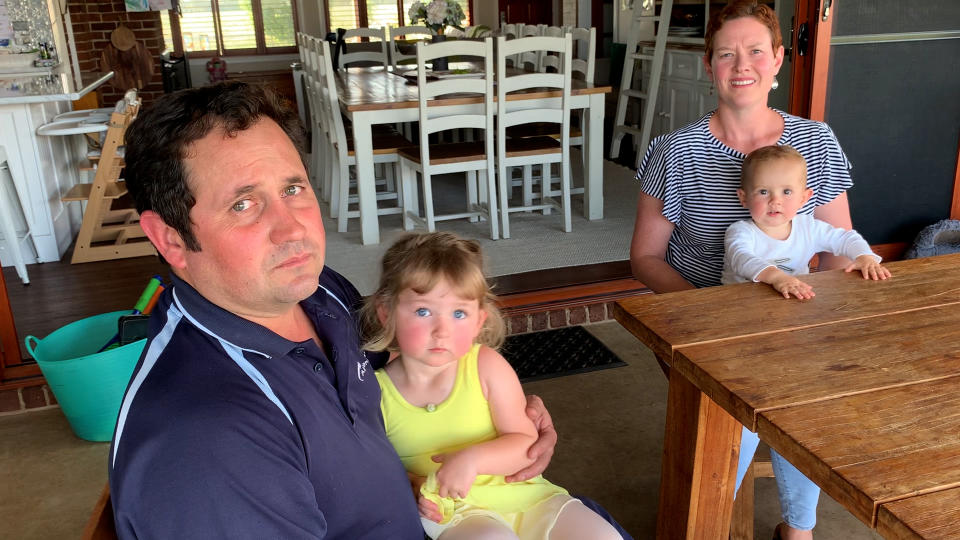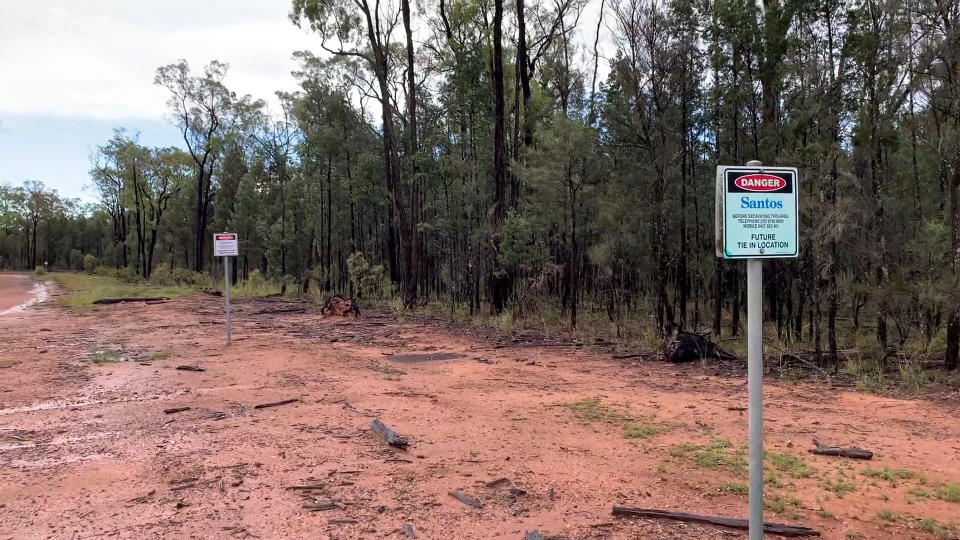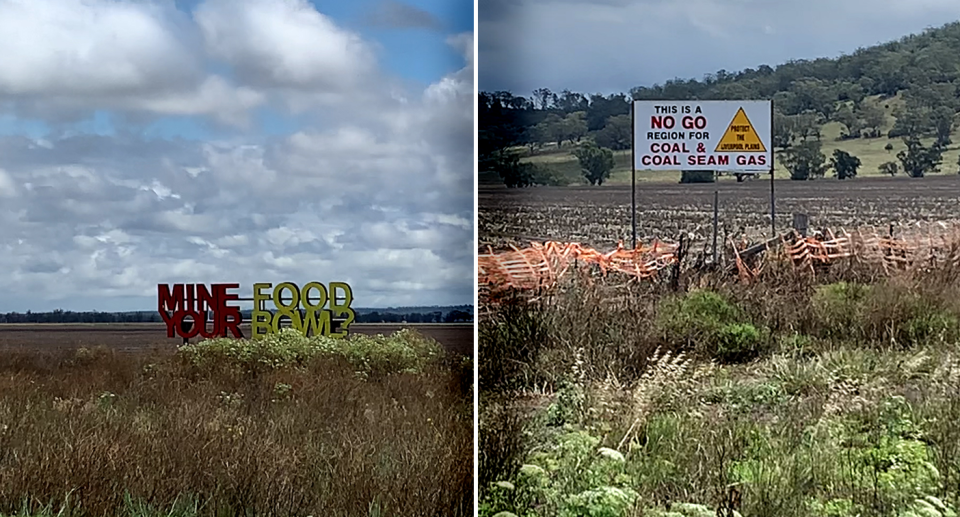Why a young dad is backing the controversial project dividing a country town
This is the third story in a four-part series, reporting on the community impact of the controversial Narrabri gas project. Part one examined farmers opposed to the project, and part two included the opinions of the Gomeroi people.
A father of two believes a controversial coal seam gas project could save the country town he lives in, which continues to struggle after surviving a decade of drought.
Fourth generation Narrabri local Justin Smith considered pulling the pin and moving away for the sake of his kids at the height of the drought last year.
He says life got “worse and worse” as people in Narrabri, 452km northwest of Sydney, and those living in the surrounding region went for months without rain.
The mood of locals “depleted” as they faced financial strain and the once green landscape around them became “eerie”.
His friends who moved elsewhere never returned.

“It was just deserted. Dust storm after dust storm, it was sort of some scene from Armageddon,” Mr Smith told Yahoo News Australia.
“If you were driving along this road here, you wouldn’t have been able to see 200 metres in front of you, rolling dust clouds.”
Energy project a ‘game changer’ say some locals
During the drought, farmers were unable to maintain crops and livestock was sold off, leading to a loss of jobs across the area.
Mr Smith believes that in order to withstand future challenges, Narrabri must diversify outside of agriculture alone.
He is firmly in support of energy giant Santos’ contentious plan to drill for coal seam gas around Narrabri’s Pilliga State Forest, and welcomed the federal government’s approval of the project on Tuesday.

According to Santos, their $3.2 billion-dollar project could create 1300 jobs during the construction process, and result in the investment of $120 million in the region.
Following the government’s approval, Santos said in a statement on Tuesday they will now embark on a 12 to 18 month appraisal program ahead of a final investment decision, with its managing director Kevin Gallagher saying the company is excited.
“As the economy recovers from COVID-19, game-changing projects like Narrabri are critical to creating jobs, driving investment, turbo-charging regional development and delivering more competitive energy prices,” Mr Gallagher said.
Pizza shop closed and shops still empty
While the drought has now broken, and farmers have gone back to harvesting their crops, the town of Narrabri itself has not recovered.
Not surprisingly, it is within the town itself that the gas project receives the most support across the wider Pilliga region.

Businesses that closed their doors on its main thoroughfare, Maitland Street, have not reopened, and many shops remain empty, impacting on the morale of locals and affecting tourism potential.
Narrabri no longer has an independent pizza shop and the closest Indian restaurant is 100km away.
For visitors with dietary requirements things could get tricky – a Google search for “vegetarian food in Narrabri” lists McDonald’s, Domino’s and an outback grill as the best dinner options.
Encouraging people in regional areas to shop locally is Narrabri local Ash Watt who runs a business with Mr Smith called Why Leave Town.
His company promotes the sale of gift cards which can be used at small independent businesses in regional areas, rather than multinational chain stores.
“This whole region has gone through so much in recent times,” he said.
“You lose the shoe shop, and then all of a sudden people head out of town for their shoes.
“Then there’s not enough money in the town to sustain three or four coffee shops.”
Mr Watt says talk of new projects like the Santos one has given locals a “spring in their step” as they believe the investment will see Maitland Street bustling again.
Widespread opposition to project across NSW
Notwithstanding the potential economic benefits, there continues to be vocal opposition from many farmers, environmentalists and Indigenous elders, who are concerned about water contamination.
A massive 98 per cent of 22,949 submissions made in relation to the Santos environmental impact statement in NSW opposed the project.

Key concerns surround Santos’ plans to drill through water bores in the recharge zone of Australia’s largest underground water source, the Great Artesian Basin, land clearing in the Pilliga State Forest, and the project’s impact on climate change.
Agricultural industry advocates NSW Farmers described the project as posing an “unacceptable risk” to water, soil and air quality.
The group’s president James Jackson added that the strict reporting arrangements Santos must comply with will not necessarily prevent anything from going wrong.
“Farmers can produce local food and fibre without gas, but it cannot be done without water,” he said in a statement.
Despite vocal opposition from farming groups to Santos’ plan, Mr Smith remains a supporter, saying the majority of people he knows are also in favour of it.
He trusts in the company to abide by the government’s regulations and feels comforted by the strict environmental conditions placed upon the project.
Part 1: Farmers fear 'there will be blood spilt' as coal seam gas battle heats up
Part 2: Gas project will destroy sacred site, Indigenous elders fear
Part 4: Concern for wildlife after contentious plan approved
Locals think in terms of generations
Mr Smith has diverse business interests around the region and is an equipment supplier to both the cotton and mining industries, meaning he could be in a position to benefit financially if Santos’ project proceeds.
His motivation for seeing it succeed however stretches beyond personal gain, he is thinking about the town’s future.
Across the wider Pilliga region, when people introduce themselves they say how many generations their family has lived in the area, and have a strong attachment to their community.
Growing up before the drought, farming was the main work option in town, and many of Mr Smith’s mates who wanted a different future moved to cities on Australia’s east coast where jobs were plentiful.
When they left and had families, their parents eventually followed so they could be close to their grandchildren.
Mr Smith believes that if Narrabri diversifies into new industries like coal seam gas drilling, young people will have career opportunities outside of agriculture.
“(I) just want to be able to give (my) kids the opportunity to grow up in the laid-back atmosphere, and have the wide open spaces, and clear blue skies and stars at night,” he said.
“If the jobs and opportunities aren’t here they definitely won't hang around, so we're hoping to give them the opportunity.
And if they hang around, we'll obviously be able to stay in the home that we love, and the area that we love, and live happily ever after.”
Santos declined repeated invitations to be interviewed for this series about how their project will affect community.
Do you have a story tip? Email: newsroomau@yahoonews.com.
You can also follow us on Facebook, Instagram and Twitter and download the Yahoo News app from the App Store or Google Play.



